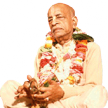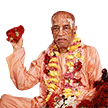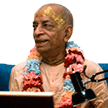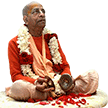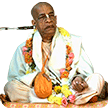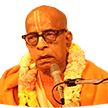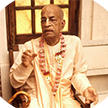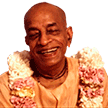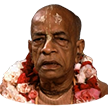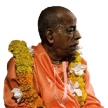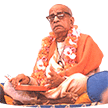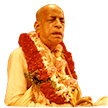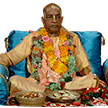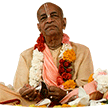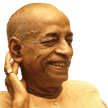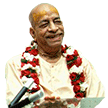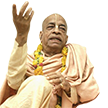A Month in the Life of Srila Prabhupada - January 1971
The Months in the Life of Srila Prabhupada present 2200+ of his lectures; 905+ of his conversations; 490+ of his morning walks;
65+ of his interviews and 6,570+ of his letters. This listing covers all available material,
- and includes:
- 10,300+ links to Vanisource - our repository of all of Srila Prabhupada's words;
- 470+ short audio clips Nectar Drops from Srila Prabhupada sprinkled throughout the months;
- 1,080 short video clips extracted from lectures, conversations, morning walks or interviews with subtitles in up to 93 languages sprinkled throughout the months;
- 13,350+ concise statements, drawn from Srila Prabhupada's lectures, conversations and letters are highlighted within quoteboxes;
- For further study on the different subjects addressed, each statement links to the various categories in our thematic section of Vanipedia named Vaniquotes;
These statements from the Months in the Life of Srila Prabhupada offer unparalleled insights into his devotional character; his vision to re-spiritualize human society; his dedication to translate, publish & distribute his books; his expertise to tirelessly lead & manage his worldwide movement; his empowered ability to encourage, care for, train & clearly communicate the disciplines he expects from all his disciples as he engages them in their pursuit of Krsna consciousness & performance of missionary activities. Through all these situations one can also experience how Srila Prahhupada consistently represents the pure teachings of Lord Caitanya Mahaprabhu and His associates.
- See also: A Day in the Life of Srila Prabhupada
- See also: the Timeline of Srila Prabhupada's Life - January 1971
Jan 1 to 3 - Surat
1971 - January 01
 vanipedia.org |
The newly acquired property I have named as Advaita Bhavan and it sounds very inviting place for me to do my translating work. |
 1971 - January 02
1971 - January 02
 1971 - January 03
1971 - January 03
| Nectar Drops from Srila Prabhupada |
| "Four kinds of men goes to worship Viṣṇu: ārta, those who are distressed; arthārthī, those who are in need of money or material benefit; jijñāsu, those who are inquisitive; and jñānī—these four kinds. Out of these, jijñāsu and jñānī are better than the ārta and arthārthī, the distressed and need of money. So even the jñānī and jijñāsu, they are not on the pure devotional service, because pure devotional service is beyond jñāna also. Jñāna-karmādy-anāvṛtam (CC Madhya 19.167). Just like gopīs, they did not try to understand Kṛṣṇa by jñāna, whether Kṛṣṇa is Bhagavān. No. They simply automatically developed—not automatically; by their previous good activities—acute love for Kṛṣṇa. They never tried to understand Kṛṣṇa, whether He is God. When Uddhava tried to preach before them about jñāna they did not hear it very attentively. They simply absorbed in thought of Kṛṣṇa. That is the perfection of Kṛṣṇa consciousness." |
| 710103 - Lecture SB 06.01.56-62 - Surat |
Jan 4 to 5 Bombay
 1971 - January 04
1971 - January 04
 1971 - January 05
1971 - January 05
Jan 6 to 11 - Calcutta
 1971 - January 06
1971 - January 06
 1971 - January 08
1971 - January 08
 1971 - January 09
1971 - January 09
 1971 - January 10
1971 - January 10
 1971 - January 11
1971 - January 11
 vanipedia.org |
I want all our students to write articles for our transcendental magazine. That is practical. |
Jan 12 to 31 - Allahabad
 1971 - January 12
1971 - January 12
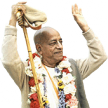 vanipedia.org |
I am very anxious to see this movement having centers in all the important cities of all the seven continents. |
 1971 - January 15
1971 - January 15
| Nectar Drops from Srila Prabhupada |
| "The Viṣṇudūta says that 'Even though one has committed so many sinful activities, if at the..., if once he utters the holy name of Nārāyaṇa, he becomes free, immediately'. That's a fact. It is not exaggeration. A sinful man, somehow or other if he chants this Hare Kṛṣṇa mantra, he immediately becomes free from all reaction. But the difficulty is that he commits again. That is nāmāparādha, offense. There are ten kinds of offenses. This is the severest offense, that after being freed from all sinful reaction by chanting Hare Kṛṣṇa mantra, if he again commits the same sin, that is a grievous criminal action. For ordinary man it may not be so severe, but one who is chanting Hare Kṛṣṇa mantra, if he takes advantage of this mantra, that 'Because I am chanting Hare Kṛṣṇa mantra, even though I commit some sin, I'll be free', he'll be freed, but because he is offender he will not achieve the ultimate goal of chanting Hare Kṛṣṇa mantra." |
| 710115 - Lecture SB 06.02.09-10 - Allahabad |
 1971 - January 16
1971 - January 16
| Nectar Drops from Srila Prabhupada |
| "The whole direction of the Vedic injunction is to understand that 'I am not this material body; I am spirit soul'. And in order to understand this factual position, there are so many directions in the dharma-śāstra, or religious scriptures. And you'll find here the Yamadūta or Yamarāja will speak, dharmaṁ tu sākṣād bhagavat-praṇītam (SB 6.3.19). Really, originally, the, I mean to say, regulator of religious principles is the Supreme Personality of Godhead. Therefore Kṛṣṇa is sometimes addressed as dharma-setu. Setu means bridge. We have to cross over. The whole plan is that we have to cross over the ocean of nescience in which we are now fallen. The material existence means it is ocean of ignorance and nescience, and one has to cross over it. Then he gets his real life." |
| 710116 - Lecture SB 06.02.11 - Allahabad |
 1971 - January 17
1971 - January 17
| Nectar Drops from Srila Prabhupada |
| "Dharma-artha-kāma-mokṣa (SB 4.8.41, CC Adi 1.90): these are the principles for elevating a living entity to the highest platform. But they have taken it, generally... They perform religious ritualistic performances for getting some more money, artha. Of course, we require some money for our maintenance; that is necessary. But if we simply perform ritualistic performances to acquire money only, that is misguided. Generally people do so. They give in charity so that they may get more money. They open dharmaśālā so that they can get more houses. That is their purpose. Or they may be elevated to the heavenly kingdom. Because they do not know what is his actual interest. The actual interest is to go back to home, go back to Godhead." |
| 710117 - Lecture SB 06.02.12-14 - Allahabad |
 1971 - January 18
1971 - January 18
 1971 - January 20
1971 - January 20
 1971 - January 21
1971 - January 21
 1971 - January 22
1971 - January 22
 1971 - January 23
1971 - January 23
 1971 - January 24
1971 - January 24
 1971 - January 25
1971 - January 25
 1971 - January 27
1971 - January 27
 1971 - January 28
1971 - January 28
 1971 - January 29
1971 - January 29
 1971 - January 30
1971 - January 30
- Lecture - Allahabad
- Lecture Hindi - Allahabad
- Lecture at the House of Mr. Mitra - Allahabad
- Lecture SB 06.02.46 - Allahabad
- Letter to Jagadisa written from Allahabad
 1971 - January 31
1971 - January 31

